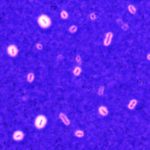Link to Pubmed [PMID] – 35963864
Link to DOI – 10.1038/s41467-022-32504-9
Nat Commun 2022 Aug; 13(1): 4751
The extracellular capsule is a major virulence factor, but its ubiquity in free-living bacteria with large environmental breadths suggests that it shapes adaptation to novel niches. Yet, how it does so, remains unexplored. Here, we evolve three Klebsiella strains and their capsule mutants in parallel. Their comparison reveals different phenotypic and genotypic evolutionary changes that alter virulence-associated traits. Non-capsulated populations accumulate mutations that reduce exopolysaccharide production and increase biofilm formation and yield, whereas most capsulated populations become hypermucoviscous, a signature of hypervirulence. Hence, adaptation to novel environments primarily occurs by fine-tuning expression of the capsular locus. The same evolutionary conditions selecting for mutations in the capsular gene wzc leading to hypermucoviscosity also result in increased susceptibility to antibiotics by mutations in the ramA regulon. This implies that general adaptive processes outside the host can affect capsule evolution and its role in virulence and infection outcomes may be a by-product of such adaptation.



